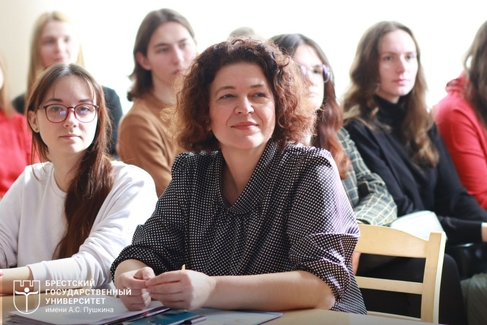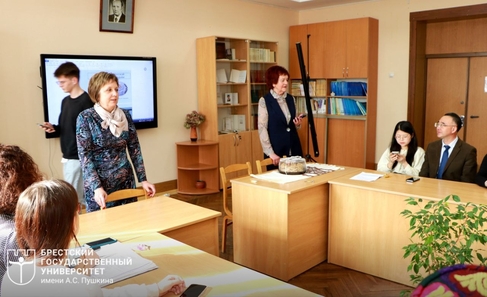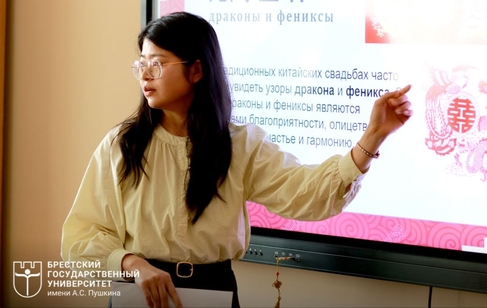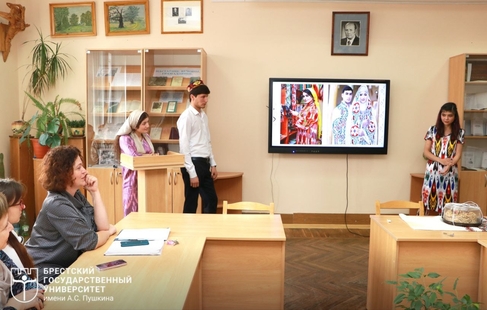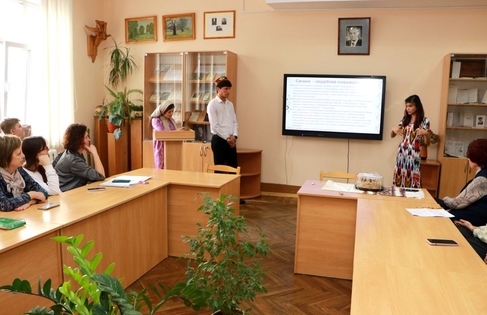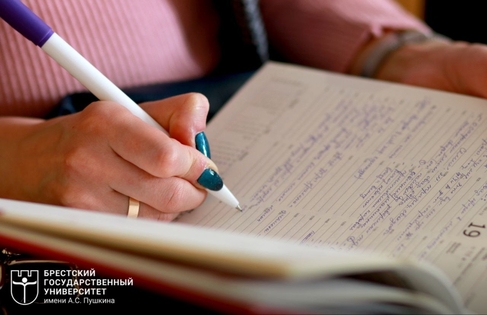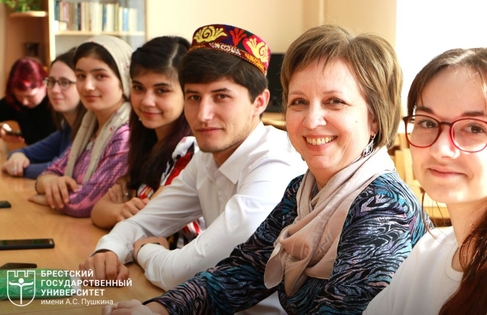-
University
21 Kosmonavtov Boulevard,
Brest, Belarus 224016
Phone number:
+375 162 21‑65‑17
Fax: +375 162 21-70-53
box@brsu.by -
Faculties
-
Education
21 Kosmonavtov Boulevard, Room 223, Brest, 224016, Belarus
Phone number: + 375 162 21-65-18
marzans@brsu.by -
Science
21 Kosmonavtov Boulevard, Brest, 224016, Belarus, Room 207
+375 162 21-66-86
nis@brsu.by
inovac@brsu.by -
International activities
21 Kosmonavtov Boulevard, Academic building № 1, Room 117, Brest, 224016, Belarus
Phone numbers: +375 162 21-06-68
+375 29 21-06-115
int@brsu.by -
Services
Weddings in cultures of different nations - an art quest for students
An art quest "Belarusian folk wedding and weddings of other world nations" was held for the students of the Philological and Socio-Pedagogical Faculties of Brest State A.S.Pushkin University. The event was organised by the Departments of Pedagogy, Russian Literature and Journalism and the Confucius Institute. The speakers allowed the participants of the event to go on a journey through the wedding rituals of Belarus, China, Tajikistan and Russia and evaluate the folk wedding traditions and customs from the point of view of today and from the position of the past.
Dean of the Socio-Pedagogical Faculties Nadezhda Alexandrovna Leoniuk and Director of the Confucius Institute on the Chinese side Fang Shengliang greeted the audience and noted that this quest is a unique opportunity to strengthen interaction between BrSU and Anhui University.
The presentation "Belarusian Traditional Wedding" was presented by Maria Stepanovna Kovalevich, Associate Professor of the Department of Pedagogy. Maria Stepanovna emphasised that folk traditions can be considered superstition or, on the contrary, centuries-old wise.
The wedding loaf is an obligatory attribute of a Belarusian wedding, a symbol of family happiness, well-being and prosperity. Baking a loaf was considered to be the beginning of the wedding, and its end - giving the ritual bread to all those present.
The audience was interested in Belarusian wedding omens. The ancestors believed that the bride would be an easy prey for evil spirits. The groom would take his beloved in his arms and bring her into the house to avoid spoilage by spirits. The students showed interest in the tradition of bride price - the groom had to pass several tasks and tests, during which he demonstrated intelligence, wit and strength. One of the most beautiful customs is connected with the bride's bouquet. It is still believed that the girl who catches it will be the next to marry.
Yang Yang, a lecturer at the Confucius Institute, demonstrated a video of a Chinese wedding and characterised in detail the wedding rituals of ancient China. Traditions of the Celestial Empire dictate such an order of preparation for a wedding. A man makes an offer to a girl and gives her gifts, finds out the compatibility of young people by dates and time of birth, sends money and gifts to the family of the chosen one. Then the wedding day is appointed and the celebration takes place. Yang Yang noted that nowadays marriage ceremonies in China are not so strict.
Students at Tajik State Pedagogical University named after S. Aini reported that in their country the wedding ritual includes matchmaking, engagement, giving kalym to the bride's parents, weaving a wedding blanket and the celebration itself. It is interesting that an important element is the conclusion of the marriage contract, for which a clergyman is invited. And what in our country is considered to be the main components of the young people's holiday - photography and a rest in a restaurant - in Tajikistan refers to post-marital rites.
In Russian tradition, a wedding is a transition from one status to another. Russian weddings have always been called heartfelt and generous. Lyudmila Vasilievna Skibitskaya, Associate Professor of the Department of Russian Literature and Journalism, told the participants of the event about it. Lyudmila Vasilievna explained the sacral meaning of wedding rituals and listed wedding prohibitions, including matchmaking on Monday, trying on the bride's dress and others.
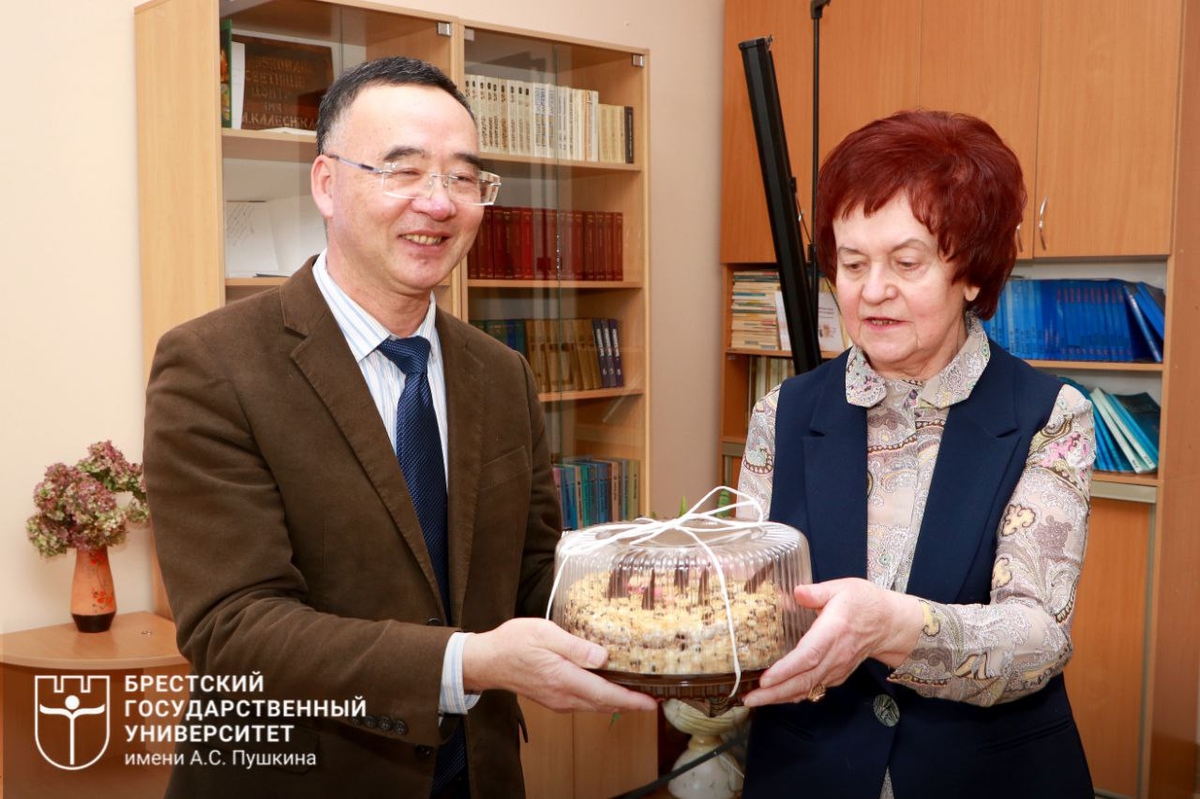
Maria Stepanovna handed a traditional Belarusian loaf to Fang Shengliang as a sign of fruitful co-operation. The participants of the quest, having consolidated their new knowledge with the help of a quiz, noticed that wedding ceremonies of different countries have similar stages, and national elements give the celebrations a special unique flavour.


